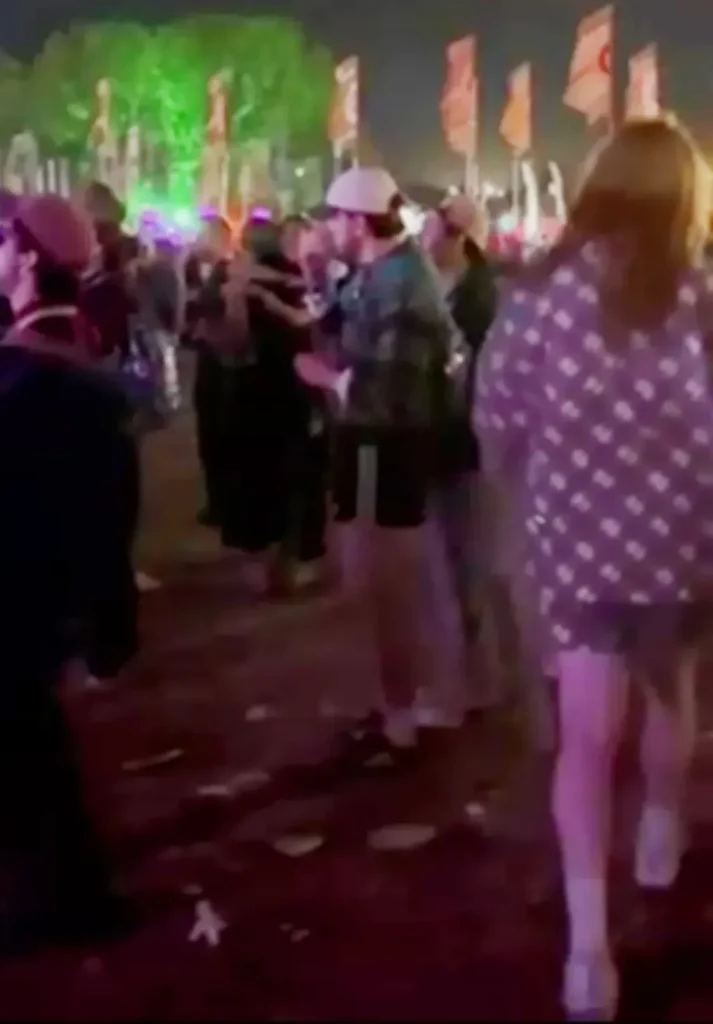The recent Glastonbury Festival controversy erupted during a performance by English punk artist Bobby Vylan, who led a crowd in chants supporting Palestine while also striking a discordant note with remarks like “Death, death to the IDF.” This provocative statement drew swift condemnation from festival organizers, including Emily Eavis, who emphasized a strict zero tolerance policy on hate speech and antisemitism. As tensions surrounding the Israel Hamas war escalate, the festival becomes a microcosm of the larger societal debates concerning free speech and political expression at public events. Critics contend that Vylan’s comments incite violence, while supporters argue they are part of a broader movement advocating for Palestinian rights. As the controversy unfolds, it raises critical questions about the role of artists in political discourse and the responsibilities of cultural institutions in moderating such discussions.
This contentious situation surrounding the renowned music festival in Somerset has sparked intense discussions about the parameters of artistic expression and political statements at public events. The uproar, which features remarks from noted performers and calls for solidarity with Palestine, has highlighted the vigorous intersection of music, culture, and activism. With the ongoing conflict between Israel and Hamas in the background, many festival-goers and artists alike are compelled to navigate their messages carefully. Events like Glastonbury serve as platforms not only for musical talent but also for powerful social commentary, making the reactions to such statements resonate far beyond the stages themselves. As we reflect on this incident, it emphasizes the pressing need to balance free expression with sensitivity towards the complex geopolitical issues currently at play.
Bobby Vylan’s Controversial Statements at Glastonbury
During the recent Glastonbury Festival, punk singer Bobby Vylan made headlines for leading the crowd in chants that included the phrase ‘Death, death to the IDF.’ This direct expression of support for Palestine, alongside the chants of ‘Free, free Palestine,’ sparked significant controversy, particularly because of the context involving the ongoing Israel-Hamas war. The comments, made in front of thousands of festival-goers, clearly showcased how artists like Vylan are increasingly intertwining music with political statements, especially in a time when global attention is sharply focused on the conflict in Gaza.
The fallout from Vylan’s performance has been extensive, prompting immediate backlash from festival organizers and political figures alike. Emily Eavis, co-organizer of Glastonbury, stated that the festival does not endorse hateful rhetoric and emphasized their commitment to uphold a zero-tolerance policy against antisemitism and hate speech. This scenario raises questions about the balance between free speech at festivals and the potential for damaging statements that may incite violence or hatred, highlighting the broader debate about artists’ roles in political activism.
Glastonbury Festival Controversy and Free Speech
The controversy surrounding Glastonbury Festival and Bobby Vylan’s statements brings to light the complex dynamics of free speech within the artistic community. Supporters argue that artists should be free to express their political views, especially in the context of significant global issues such as the Israel-Hamas conflict. However, critics contend that certain messages can cross the line into incitement or hate speech, particularly when they target specific groups or nations, like Israel. This incident calls into question not only the responsibility of performers but also the ethical implications of their audiences.
As festivals continue to serve as platforms for social and political discourse, the challenge for organizers is to navigate a fine line between artistic freedom and the potential consequences of inflammatory speech. Eavis highlighted the importance of peace and unity in the festival’s messaging, yet the strong reactions to Vylan’s declarations reflect the polarized views that many hold regarding the ongoing conflict. Ultimately, this controversy opens a broader dialogue about how music festivals can maintain their spaces as platforms for expression while also safeguarding against messages that may incite division rather than foster understanding.
Public Reaction to Political Messages at Festivals
Following Bobby Vylan’s remarks at the Glastonbury Festival, the public reaction has been mixed, mirroring the intense division surrounding the Israel-Palestine discourse. Some attendees applauded Vylan for speaking out in favor of Palestine, feeling that it is crucial for artists to address political issues and advocate for social justice. Conversely, many have condemned his approach, particularly the violent undertones of his chants, citing examples from history where similar rhetoric has escalated conflicts. This demonstrates the complex and often polarizing nature of political discourse within entertainment.
Moreover, the incident has sparked further discussions about the broader impact of artistic expression in times of conflict. While some argue that platforms like Glastonbury should encourage civil discourse and promote peace, others assert that they must remain spaces for challenging the status quo and igniting change. As a result, it becomes increasingly important for festivals to define their stances on sensitive issues and encourage performers to navigate the implications of their messages carefully.
Impact of the Israel-Hamas War on Cultural Events
The ongoing Israel-Hamas war has profoundly influenced various cultural events across the globe, including the Glastonbury Festival. As public sentiment shifts in response to the conflict, festivals that traditionally celebrate music and art are increasingly serving as venues for political expression and activism. The chaotic backdrop of rising casualties in Gaza has led many artists to harness their platforms to voice support for Palestine, as observed with Vylan’s performance.
This environmental shift not only adds a layer of complexity to performances but also invokes questions about the role artists play as commentators on global issues. The current scenarios reflect a growing trend where pop culture intersects with political narratives, prompting festival-goers and audiences to engage with messages that challenge their perceptions of justice and morality. As such, the cultural landscape is shifting, and events like Glastonbury will likely continue to reflect the tumultuous socio-political climate.
Festival Policies on Hate Speech and Political Speech
In light of the recent controversy involving Bobby Vylan, it’s essential to revisit the policies that festivals like Glastonbury have regarding hate speech and political statements. With Emily Eavis reaffirming the festival’s zero-tolerance stance against antisemitism and hate speech, it prompts a critical examination of how these policies are implemented in real-time during performances. As the lines between artistic freedom and harmful rhetoric continue to blur, festivals must ensure their guidelines clearly define boundaries around acceptable speech.
The challenge for such major cultural events lies not just in establishing these policies but also in enforcing them fairly and consistently across diverse performances. As more artists choose to voice their opinions on contentious global issues, festival organizers face the responsibility of creating an environment that respects free expression while also protecting attendees from divisive or incendiary messages. This balance is crucial for maintaining integrity and safety within the festival space.
Glastonbury’s Commitment to Peace and Unity
Glastonbury Festival has always aimed to promote values of peace and unity, as heavily emphasized by co-organizer Emily Eavis in response to the recent controversy. The festival’s mission extends beyond music, aiming to create a space where diverse perspectives can thrive while fostering an atmosphere that discourages hate and violence. In light of Vylan’s comments, Eavis has reiterated Glastonbury’s commitment to these ideals, reinforcing that while artists may express their views, they should do so in a manner that does not incite division within the community.
The festival’s approach encourages a dialogue about the responsibilities artists hold when addressing sensitive topics, especially amid significant global strife like the ongoing Israel-Hamas conflict. By promoting messages of peace, Glastonbury hopes to cultivate an environment where fans can enjoy music while also contemplating the broader implications of political expressions. This philosophy not only enhances the festival’s brand but positions it as a pioneer of cultural integration and social activism.
Responses from Authorities and Law Enforcement
In response to the backlash faced by Bobby Vylan’s chants at Glastonbury, law enforcement, specifically Avon and Somerset police, announced an investigation into the matter. By reviewing video evidence, they aim to determine if any criminal acts occurred during the performance. This initiative indicates how seriously authorities are taking the comments, particularly in light of the potential implications they hold, given the sensitivities surrounding the ongoing conflict between Israel and Hamas. Police involvement showcases the intersection of cultural events and legal frameworks, highlighting the responsibilities that come with public speech.
Moreover, the involvement of officials such as the Israeli Embassy in the U.K. reflects the diplomatic sensitivities that surround political expressions during public events. The embassy condemned Vylan’s remarks, labeling them as incitements to hatred and a dangerous precedent for public discourse. Their response points to the responsibility artists carry, as their words may have broader ramifications on international relations and social harmony. This raises awareness of how cultural platforms intersect with diplomatic narratives and the potential fallout from reckless or inflammatory speech.
The Aftermath: Consequences for Artists and Festivals
The aftermath of the Glastonbury Festival controversy highlights the consequences artists can face in the wake of politically charged statements. Bobby Vylan has experienced a mixed response, with both support from activist circles and backlash from those viewing his comments as dangerously inflammatory. This duality exemplifies how artists today must navigate a landscape filled with heightened scrutiny, where words have the power to unite or incite division among audiences.
For festivals, the challenge lies in managing the reputational risks associated with performers’ political statements. The Glastonbury Festival will need to reassess its approach towards artist engagement and the messaging that underpins its events. This incident serves as a learning opportunity for festivals worldwide, highlighting the importance of establishing clear guidelines on acceptable speech and ensuring that platforms remain constructive and peaceful, ultimately preserving the essence of cultural celebration.
Intersection of Music, Activism, and Cultural Responsibility
The incident at Glastonbury underscores the growing intersection between music, activism, and cultural responsibility. Artists like Bobby Vylan increasingly use their platforms to speak out against injustices, resonating with audiences that seek deeper engagement with the world’s issues. However, the fine line between activism and incitement is becoming blurred, prompting both artists and organizers to reflect on their responsibilities toward their communities and the wider global conversation, particularly in light of intense conflicts such as the Israel-Hamas war.
Festivals are not just venues for entertainment; they are increasingly becoming arenas for important dialogues on social issues. This evolution challenges the music industry to adopt ethical frameworks for addressing political sentiments expressed on stage. The need for festivals to embrace inclusivity while consciously addressing the complexities of political engagement will be essential in shaping future events that aim to foster understanding and unity rather than division and discord.
Frequently Asked Questions
What caused the Glastonbury Festival controversy surrounding Bobby Vylan’s performance?
The Glastonbury Festival controversy arose when English punk singer Bobby Vylan led the crowd in chants of ‘Death, death to the IDF’ during his performance while expressing support for Palestine. His comments were made amidst rising global criticism of Israel, particularly related to the ongoing Israel-Hamas war.
How did the Glastonbury Festival’s organizers respond to Bobby Vylan’s comments?
Emily Eavis, the co-organizer of the Glastonbury Festival, condemned Bobby Vylan’s statements as crossing a line and reiterated the festival’s zero tolerance policy against antisemitism and hate speech, particularly in light of the support for Palestine expressed during his performance.
What implications did Bobby Vylan’s comments have on free speech at the Glastonbury Festival?
The controversy raises questions about festival free speech, highlighting the tension between artistic expression and the responsibility of artists to avoid language that incites violence or hate. While Glastonbury values free speech, it also maintains a stance against statements that promote violence, as reflected in the backlash against Vylan’s remarks.
What was the reaction to the criticism of Israel during the Glastonbury Festival?
The Glastonbury Festival controversy reflects a wider audience reaction amidst increasing global criticism of Israel, particularly related to the violent backdrop of the Israel-Hamas war. The statements made during the festival were met with mixed responses, revealing a polarized public opinion on the matter.
Did police take any action regarding the Glastonbury controversy involving Bobby Vylan?
Following Bobby Vylan’s remarks, Avon and Somerset police announced they would review video evidence from the performance to assess whether any criminal actions occurred, indicating that the controversy surrounding the festival was taken seriously.
How did Bobby Vylan defend his comments on social media?
Bobby Vylan defended his controversial comments on Instagram, noting both support and backlash, and emphasized the importance of activism. He encouraged visible campaigning for societal change, reinforcing his stance with the phrase, ‘I said what I said,’ which has resonated in discussions about the Glastonbury Festival controversy.
What official statements were made by the Israeli Embassy regarding the Glastonbury Festival incident?
The Israeli Embassy in the U.K. condemned Bobby Vylan’s remarks during the Glastonbury Festival, describing them as deeply offensive and inciting hatred towards Israel. The embassy underscored that such rhetoric is dangerous, especially in a prominent public setting, suggesting it could normalize extremist views.
Why is the Glastonbury Festival controversy significant in pop culture discussions?
The Glastonbury Festival controversy is significant because it highlights the intersection of pop culture and political activism, showing how artistic expressions can provoke strong responses regarding sensitive political issues like the Israel-Hamas war, thus shaping dialogue around free speech, responsibility, and activism.
| Key Point | Details |
|---|---|
| Glastonbury Festival Condemnation | The festival condemned chants led by Bobby Vylan that included “Death, death to the IDF,” expressing disapproval of the remarks. |
| Emily Eavis’ Response | Festival co-organizer Emily Eavis stated that she was appalled and emphasized a zero tolerance policy towards hate speech. |
| Global Criticism of Israel | Criticism of Israel has intensified since the Israel-Hamas conflict began on October 7, 2023, leading to a high death toll in Gaza. |
| Vylan’s Justification | Bobby Vylan defended his remarks on Instagram, stating that activism should be taught and visible. |
| Police Investigation | Avon and Somerset police announced they would look into video evidence concerning potential criminal actions. |
| Reactions from BBC and Israeli Embassy | The BBC found Vylan’s comments deeply offensive, while the Israeli Embassy condemned them for inciting hatred. |
| Intersection of Pop Culture and Activism | The controversy reflects a growing blend of pop culture and political expression, triggering diverse public responses. |
Summary
The Glastonbury Festival controversy has sparked significant debate following controversial remarks by Bobby Vylan during his performance. This incident has drawn attention to the intersection of music and political activism, showcasing how public events can bring sensitive global issues to the forefront. Vylan’s statements and the festival’s response highlight the complexities surrounding activism, freedom of speech, and the implications of public discourse in today’s sociopolitical climate.



